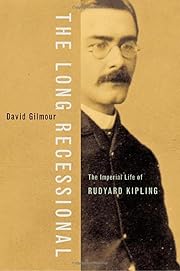

Click on a thumbnail to go to Google Books.
|
Loading... The Long Recessional: The Imperial Life of Rudyard Kiplingby David Gilmour
 No current Talk conversations about this book. no reviews | add a review
AwardsDistinctions
Rudyard Kipling (1865-1936) was a unique figure in British history, a great writer as well as an imperial icon whose life trajectory matched that of the British Empire from its zenith to its final decades. Kipling was in his early twenties when his first stories about Anglo-Indian life vaulted him into celebrity. He went on to be awarded the Nobel Prize, and to add more phrases to the language than any man since Shakespeare, but his conservative views and advocacy of imperialism damaged his critical reputation -- while at the same time making him all the more popular with a general readership. By the time he died, the man who incarnated an era for millions was almost forgotten, and new generations must come to terms in their own way with his enduring but mysterious powers. Previous works on Kipling have focused exclusively on his writing and on his domestic life. Here, the distinguished biographer David Gilmour not only explains how and why Kipling wrote, but also explores the themes of his complicated life, his ideas, his relationships, and his views on the Empire and the future. Gilmour is the first writer to explore Kipling's public role, his influence on the way Britons saw themselves and their Empire. His fascinating new book, based on extensive research (especially in the under explored archives of the United States), is a groundbreaking study of a great and misunderstood writer. No library descriptions found. |
Current DiscussionsNonePopular covers
 Google Books — Loading... Google Books — Loading...GenresMelvil Decimal System (DDC)828.809Literature English & Old English literatures English miscellaneous writings 1837-1899 Individual authorsLC ClassificationRatingAverage: (3.88) (3.88)
Is this you?Become a LibraryThing Author. |
||||||||||||||||||||||||||||||||||||||||||||||||||||||||||||||||||||||||||||||||||||||||||||||||||||||||||||||||||||||||
Kipling lived much of the first half of his life in the Empire - he spent his early years in India, except for a horrid stretch when he was boarded back in England by his parents who stayed in British India, and later lived off-and-on in South Africa. Kipling loved the Empire and its civilizing mission (up to a point - he did not favor Christian religious proselytizing), but oddly was not that fond of England or the English.
Gilmour paints a portrait of Kipling as a thorough-going reactionary, a pessimist, a virulent opponent of women's suffrage, Irish Home Rule, nearly all politicians (he especially hated Liberals, but also accused Winston Churchill of ‘political whoring’), democracy, trade unions, and imperial wavering of any kind.
'The Long Recessional' (the title refers both to his poem written for Queen Victoria's Diamond Jubilee in 1897 and the decline of the Empire) is not so much a history of Kipling's literary works as it is leading role in promoting the Empire through his literature. Readers seeking detailed literary analyses had best look elsewhere, but should read this book first to understand what it was that Kipling was so all-fired angry about most of the time. Kipling was something of a negative "prophet"; he saw the coming decline of the Empire and viewed it as willful surrender, he saw the coming Great War and watched his countrymen fail to prepare or take a firm stand against 'the Hun', and he saw the coming Second World War and the repeated lack of preparation (he died before that war actually occurred).
Kipling suffered great personal unhappiness from the death of his first daughter at age 6, to a seemingly unhappy marriage with Kipling as the henpecked husband and the death of his son in one of those insane headlong infantry assaults on the German trenches. Kipling's dour personality in most of his last quarter-century of life may to some extent be attributed to a misdiagnosed (and thus mistreated) duodenal ulcer that caused him great pain - once it was correctly diagnosed in 1933, Kipling's pain departed and his personality revived.
Kipling's writings were enormously influential in his time, probably to an extent difficult for the modern reader to grasp given over as we are to the visual and aural. After the Boer War he turned his pen more and more toward political ends and a bitter-tipped pen it was. Today Kipling is more remembered for his children's classics such as[[ASIN:0451529758 The Jungle Books (Signet Classics)]]. His [[ASIN:1434616509 Plain Tales from the Hills]] explores India's impact on the British who lived there and in particular the soldiers who sometimes fought and died there.
Salmon Rushdie has summarized it best when he stated, "There will always be plenty in Kipling that I will find difficult to forgive; but there is also enough truth in these stories to make them impossible to ignore."
Gilmour brings Kipling back to life for some 300 pages; 'The Long Recessional: The Imperial Life of Rudyard Kipling' is a rewarding reading experience about a man mostly overlooked today, but of towering importance in his time. (